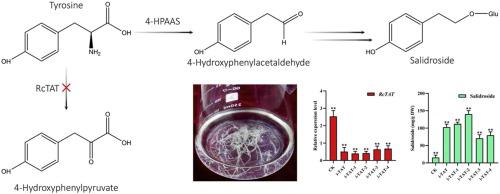Industrial Crops and Products ( IF 5.9 ) Pub Date : 2021-09-25 , DOI: 10.1016/j.indcrop.2021.114075 Xuechao Liu 1 , Yueli Tang 1 , Junlan Zeng 1 , Jianbo Qin 2 , Min Lin 3 , Min Chen 4 , Zhihua Liao 1, 2 , Xiaozhong Lan 1, 5

|
Rhodiola crenulata is a traditional Tibetan medicinal plant mainly distributed in high altitude areas of Tibet. As the main extract of R. crenulata, salidroside has important medicinal activities in enhancing the body’s immunity and resisting microwave radiation by influencing cell metabolism. Tyrosine is the starting amino acid precursor for salidroside biosynthesis. As an aromatic amino acid, tyrosine participates not only in salidroside biosynthesis, but also in other metabolite biosynthesis which might compete against salidroside biosynthetic pathway. In this study, we functionally identified a tyrosine aminotransferase in R. crenulata (RcTAT) that could convert tyrosine into 4-hydroxyphenylpyruvate (4-HPP). The Km and Vmax values of RcTAT for tyrosine were respectively 0.21 mM and 0.17 μmol/min.mg under 9.0 pH and 39 °C. RNAi-mediated suppression of RcTAT expression markedly increased salidroside production in hairy root culture of R. crenulata. In summary, RcTAT is a key gene involved in the metabolic pathway that competes against salidroside biosynthesis, and suppressing its expression is a promising way to elevate salidroside production in planta.


























 京公网安备 11010802027423号
京公网安备 11010802027423号